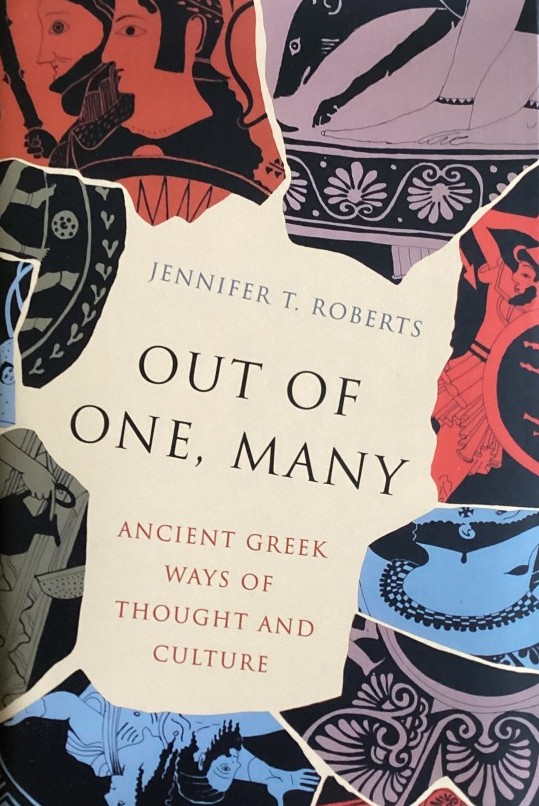Inspiring Older Readers
 posted on 12 May 2024
posted on 12 May 2024
Out of One, Many: Ancient Greek Ways of Thought and Culture by Jennifer Roberts
Like many people who went through the British education system, I was never given any systematic or useful introduction to the Classical Worlds of Greece and Rome. From school to university, undergraduate and post-graduate, fleeting and often oblique references were made to just how important Ancient Greek culture was to the way we live now but we were left to our own devices to discover just what that really meant. I will confess now that I didn’t get much further than most of my peers and I share a flimsy understanding of what the Ancient Greeks left us: myths, a panoply of Gods, philosophy, drama (tragedy and comedy), some (now picturesquely crumbling) architecture, Homeric epics and Sappho’s poetry.
And all with no real sense of how the ideas emerged or, for that matter, when.
If you share this chaotic and unfocussed set of scraps and out-of-focus ideas of the legacy of Ancient Greek culture but also have the lingering, slightly guilty, feeling that you really should know more, then Jennifer Roberts, Out of One, Many: Ancient Greek Ways of Thought and Culture is the book for you. And, I should add that if you’re just setting out on your studies and have youth on your side, you’ll also want to get your hands on this.
All the things I mentioned above – the myths, the Gods, Homer etc. – are here but in a structured and accessible way. The book is engagingly written and accessible for the lay-person (like me) but that doesn’t involve skimping on detail - and some of the textual analysis of the literature that has come down to us is admirable.
The first thing to get your head around is that when we’re using the term ‘Ancient Greece’ we’re talking about an extraordinary span of time – from the Bronze Age (circa 2200BCE) right through to the end of the Hellenistic Age in 30BCE – and for an appreciable period there is no single ‘Greece’ but an assemblage of city states that moved between cooperation and antagonism. It is also the case that there are plenty of different attitudes expressed in the literature of the different ages but some ideas are more consistent than others: religious belief in the world of the Gods provides a constant touching point; there’s a consistent dislike or fear of foreigners; women are most often cast as inferior and their roles and their achievements are often ignored or airbrushed out of the record.
I thought that Roberts captures the nature of the uncertainty that surrounds the study of the Ancient Greeks when she turns to the work of Homer. For those of us who have read (parts) of the two epics usually attributed to him, The Odyssey and The Iliad, it is sobering to read this:
“Although they formed the core of the Greek educational system, their genesis has been the most hotly debated subject in all classical scholarship. When were the poems composed? With or without the aid of writing? How many people were involved, and over how long a period of time? What era do the epics depict? This Trojan War – did it ever take place? Did Achilles and Helen and Odysseus and Penelope actually live? (The short answer to all of the above: we don’t know.)”
And I feel that this sets the scene perfectly for us. We need a skilled interpreter of the evidence to steer us through the birth of theatre, the rise of philosophy, to navigate the debates about what constitutes the best political system to live under and to unravel the meanings of the myths and the role of the Gods – fortunately Jennifer Roberts is just that person.
Available now from Princeton University Press, you’ll be able to get a copy from your local independent bookshop – who will be glad to order you a copy if they don’t have it on the shelf.
Terry Potter
May 2024